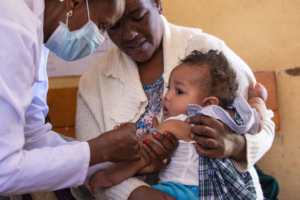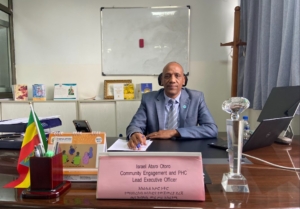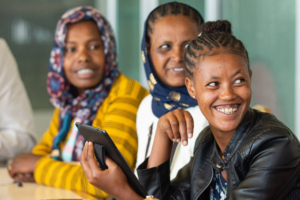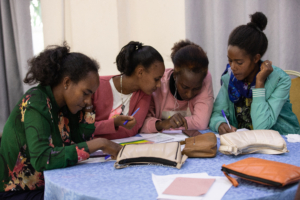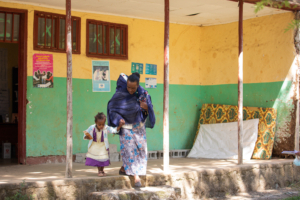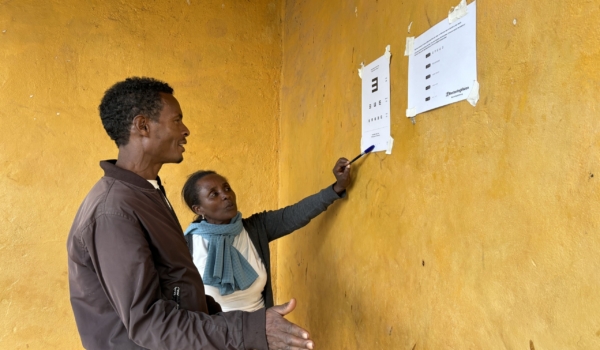In 2021, Ethiopia’s Ministry of Health estimated that nearly 800,000 children across the nation had received zero doses of routine childhood vaccines. Facing a serious risk of illness or death from preventable causes, nearly 90% of these children were concentrated in four regions. In 2023, having identified immunization as an urgent community health priority, the Ministry launched a new partnership with Last Mile Health and GAVI, the vaccine alliance, to address these needs through new evidence-based training for community health workers in the regions and woredas most in need.
Background: Blended training boosts learning outcomes in Ethiopia’s community health workforce
Ethiopia’s national Health Extension Program brings primary care to communities across the country through more than 40,000 female community health workers. Known nationally as health extension workers, they are trained across an essential package of primary care skills, offering preventative, curative, and referral services to patients within their own communities.
In addition to their pre-service training, Ethiopia’s community health workers receive regular in-service refresher training to maintain and improve their skills and knowledge. Since 2021, Last Mile Health has partnered with the Ministry of Health to adapt in-service trainings into an innovative blended learning format, utilizing both in-person and digital sessions to improve learning outcomes while reducing recurring training costs by nearly 40%. Initially piloted with a training module in reproductive, maternal, newborn, and child health, the blended learning approach has now been formally adopted for all community health worker training, with new modules being developed by Last Mile Health and the Ministry of Health as the existing module is scaled across new woredas and regions. “A digitalized blended learning approach has been a proven approach in order to provide effective, efficient, and quality training,” explains Israel Ataro, Lead Executive Officer for Community Engagement and Primary Health Care.
The project: Targeting immunization training to improve health outcomes
In January 2023, Last Mile Health, GAVI, and the Ministry of Health partnered to develop enhanced content on immunization as part of the foundational blended training, which included all maternal and child health modules. The training would improve community health workers’ understanding of key immunization topics and provide applied training in practical skills and interventions, with the goal of equipping them to identify and track children’s immunization status and improve services provided to mothers and children.
“Prior to this project, community health workers in Ethiopia had never been trained on the latest concepts and approaches for managing immunization interventions,” explains Abraham Zerihun Megentta, Last Mile Health’s Ethiopia Country Director. But now, the new training covers four key interventions:
- Zero-dose: Community health workers should focus on zero-dose children who have not received their first dose of any routine childhood immunizations.*
- Missed opportunities for immunization: Reduce the missed opportunities for vaccination by ensuring eligible children can access their routine vaccinations while accessing other routine health services.
- Catch up immunization: Provide optimal protection against disease by prioritizing the completion of a child’s recommended vaccination schedule when doses have been missed.
- Integration: Improving the way immunization services are delivered by integrating them with other health services, and by better sharing resources and data.
The project included training and deploying community health workers to conduct household-to-household visits in high risk areas where they identified, registered, and mapped children who had received zero doses of routine childhood immunizations. Out of 3,910 children screened,1,429 (37%) were classified as either underimmunized or zero-dose: a high prevalence that reflects an urgent need in the targeted communities.
Building from this data, community health workers used tools from their training to determine barriers to immunization and develop strategies for ensuring mothers and their children could access care and catch up on missed doses. Follow-up with families demonstrated dramatic improvements in immunization status among the cohort of zero dose and underimmunized children being tracked: after the first follow-up appointment, the proportion who were zero dose decreased from 59% to <1%, and under-immunized decreased from 41% to 23%, with 74% of the children now vaccinated for their age.** By the second follow-up, 96% of children being tracked were fully vaccinated for their age.
“The training is very important because it makes us remember what we have forgotten and gives us new information about what we don’t know,” explains Hiwot Dessie, a community health worker who delivers care in Amhara Region’s Libo Kemkem woreda. “For example, we did not used to give vaccination when children missed their schedule and they were above the age of one. We have learned in this training that we can give measles and polio up to five years old, and if there are zero doses for those over one year old who have not started vaccination, we will register the children and start them in the routine vaccination. This is new information that will help us reach unvaccinated children.”
Looking ahead: Implications and opportunities
“The data show a huge leap in immunization status among zero dose and underimmunized children,” says Julie Krause, Director of MERL Technical Support on Last Mile Health’s Global Monitoring, Evaluation, Research, and Learning team. The compelling results are due to the power of strong training for community health workers, who are well positioned to identify zero-dose or underimmunized children, and ensure they can access the doses they need to live healthy lives.
Data from this partnership with GAVI indicate that improvements in knowledge and skills are significant from the blended learning approach and can benefit a larger number of community health workers to deliver high quality immunization services when these topics are effectively integrated into their training. The data support the effectiveness of child tracking via community health workers’ house-to-house visits and regular follow-up with zero-dose and underimmunized children when paired with strong training and practical skills.
Building on these exciting results, Last Mile Health aims to replicate the success of this project in more communities. By further examining the data, as well as speaking with community health workers to understand what aspects of training and interventions were especially effective, we seek to apply these approaches in future trainings.
Improved training leads to improved skills for community health workers—and improved results for patients. As Last Mile Health and the Ministry work together to scale up the new immunization training, backed by evidence that demonstrates effectiveness, community health workers like Hiwot will be better equipped to change health outcomes for children at the last mile. “The communities I serve are people who are not in the city, those who live in far places, who don’t get services, who don’t have transportation, and who don’t have convenient conditions,” she says. “As a community health worker, I can be near them and fulfill their needs and do my best to make them happy and provide services. This is my satisfaction.”
*Zero-dose children are those that have not received any routine vaccine. For operational purposes, GAVI defines zero-dose children as those who lack the first dose of diphtheria-tetanus-pertussis containing vaccine (DTP1). Source: GAVI
**Due to security issues, follow-up data were not collected for any children from Amhara (14% of original cohort, n=204); the baseline and follow-up data here exclude these children.

